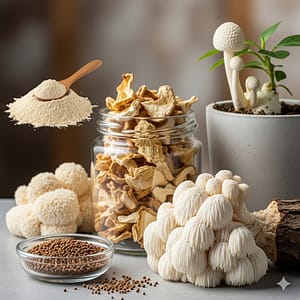- Home
- Lion’s Mane Mushroom

I. General Information
A. Scientific Name:
Hericium erinaceus
B. Alternative Names:
Hedgehog mushroom, Bearded tooth mushroom, Yamabushitake (Japanese), Hou Tou Gu (Chinese)
C. Pronunciation:
/ˈlaɪənz meɪn/ (LY-uhnz Mayn)
II. Sourcing and Origin
A. Source:
A species of edible and medicinal fungus that grows on hardwood trees.
B. Geographic Origin:
Native to North America, Europe, and Asia.
C. Method of Processing:
Lion's Mane mushroom is cultivated commercially on sawdust or grain-based substrates in controlled indoor environments. It is often dried and powdered for use in supplements.
III. Properties and Uses
A. Physical Properties:
White, shaggy, and globular with cascades of spines. It has a mild, savory taste and a texture similar to crab or lobster when cooked.
B. Chemical Composition:
Rich in hericenones and erinacines (compounds that may stimulate nerve growth factor).
Contains β-glucans (immune-supporting polysaccharides).
Vitamins: B-complex (B1, B2, B3, B5), vitamin D (if sun-exposed).
Minerals: Potassium, zinc, iron, and selenium.
High in protein and fiber, low in fat.
C. Primary Uses:
Skincare: Antioxidant and anti-inflammatory properties, supports skin regeneration and barrier protection.
Haircare: Improves scalp circulation and provides nutrients for healthy hair growth.
Wellness: Enhances cognitive function, supports memory and focus, promotes nerve health, boosts immunity, may aid digestion and gut health.
Culinary: Edible with a seafood-like texture and flavor (often compared to crab or lobster). Used in stir-fries, soups, and meat substitutes.
Household/Industry: Gaining interest in natural wellness products and functional foods.
D. Key Benefits:
Promotes brain health, supports the nervous system, and has anti-inflammatory and antioxidant properties.
IV. Safety and Considerations
A. Potential Allergies:
Rare, but can cause digestive upset or skin rashes in some individuals.
B. Best Practices for Use:
Consume as a food or take in a powdered or capsule form from a reputable supplier.
C. Special Precautions:
Generally safe as a food and supplement.
Rare allergic reactions may occur (skin rashes, respiratory issues).
Some reports of digestive upset when taken in high doses.
People with mushroom allergies or those on prescription medications should consult a healthcare professional before use.
V. Fun & Educational Facts
A. Historical Context:
Lion's Mane mushroom has been used for centuries in traditional Chinese medicine and Japanese herbalism.
B. Did You Know?
The name "Lion's Mane" comes from its unique appearance, which resembles a cascade of white hair.
C. DIY Recipe Idea:
"Crab" Cakes: When cooked, Lion's Mane mushroom can be shredded and used as a plant-based substitute in recipes like crab cakes due to its texture.
